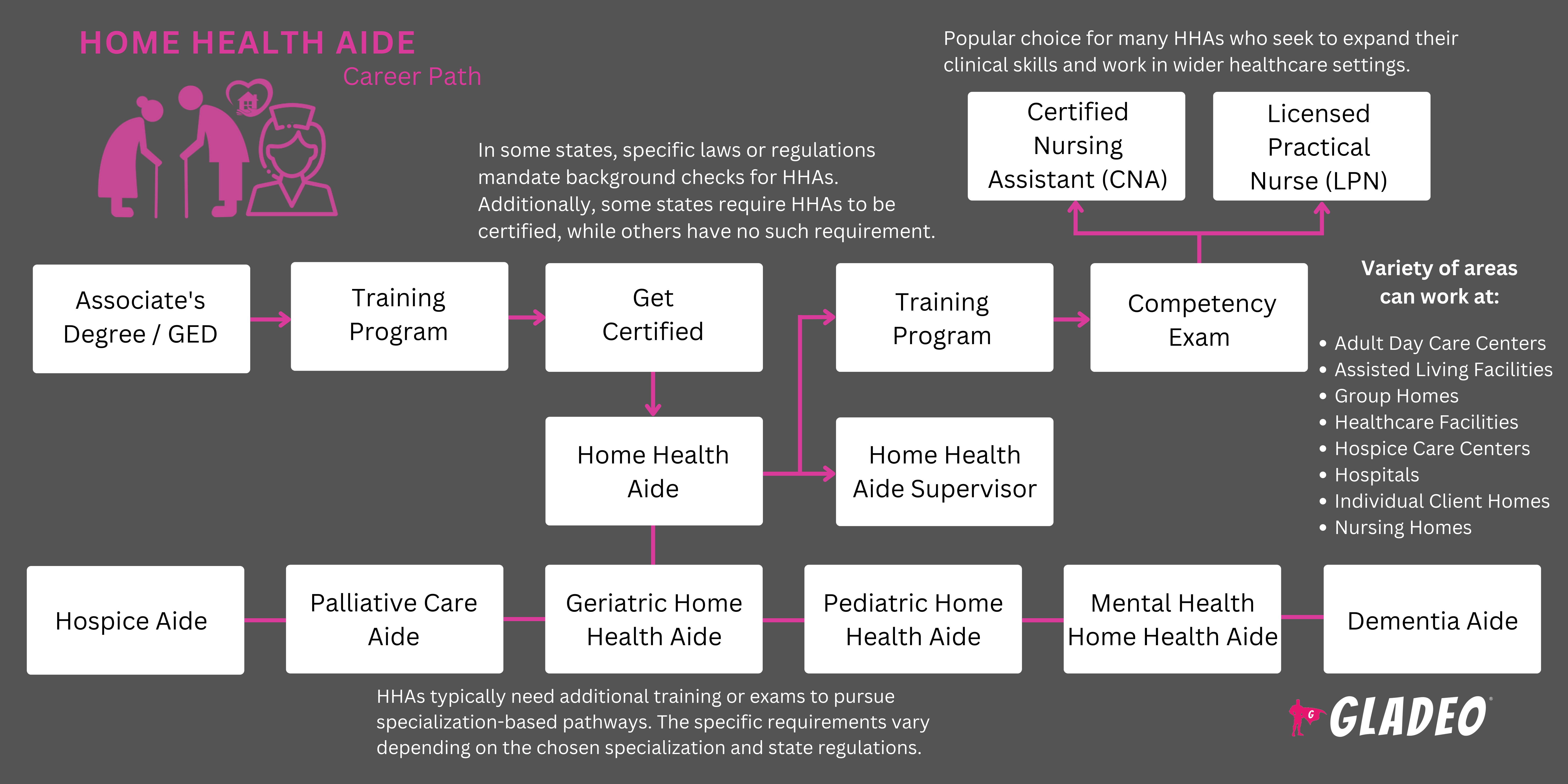聚光灯
护理人员、认证家庭健康助理(CHHA)、认证医疗助理(CMA)、认证护士助理(CNA)、家庭护理员、家庭护理助理、家庭健康助理(HHA)、家庭健康服务提供者、临终关怀助理、居家护理员、个人护理助理
家庭健康助理(HHAs)为所有年龄段的慢性病患者、残障人士、术后或住院康复者以及有特殊需求的患者提供居家护理与支持。在需要额外帮助的情况下,他们甚至能协助新生儿母亲。
在某些州被称为个人护理助理的家庭健康助理(HHA),确保其照护的患者无需入住医疗机构也能获得安全、舒适且周到的护理。由于护理在家庭环境中进行,患者有时会被称为"客户"。其职责包括协助患者活动与锻炼、个人卫生护理、穿衣及进食。
作为患者医疗团队的前线成员,家庭健康助理能直接观察患者的行为与变化,并将信息反馈给护士、医生及其他医疗人员。这些观察有助于及时采取医疗干预措施,显著延长患者寿命。家庭健康助理还承担基础医疗任务,例如监测生命体征或协助用药。他们更扮演着关怀陪伴者的角色,帮助缓解患者潜在的孤独感,从而提升患者的生活质量!
- 对患者的健康状况、寿命及日常生活质量产生直接影响
- 医疗保健领域日益增长的需求
- 众多个人与职业发展的机遇
工作时间安排
家庭健康护理员可选择兼职或全职工作。工作时间可能包括清晨、深夜、周末或夜班。
典型职责
协助患者(即客户)进行个人卫生、梳洗和穿衣- 协助准备餐食和进食,同时满足饮食需求
- 协助移动,例如帮助患者下床、坐到椅子或轮椅上,或在周围走动
- 指导患者进行处方锻炼,并学习使用医疗辅助器具
- 完成日常家务,如洗衣服和洗碗。
- 观察患者并维护其护理记录。监测生命体征。追踪进展与问题。向医护人员报告病情变化。
- 提供陪伴与情感支持。与患者进行交谈,为他们朗读书籍或新闻,播放音乐,并参与有趣或能激发思维的活动。
- 安排社交活动并协助组织旅行
- 安排交通工具并陪同客户前往预约地点及外出活动
- 安排日程、预约行程、处理本地事务
- 提供用药提醒,并在接受过培训、获得认证且获得授权的情况下给药
- 与家庭成员及其他护理人员协作,确保护理的一致性
- 支持并指导患者掌握安全独立的行为能力,以及如何适应生活变化
- 按指示进行简单处理并更换绷带或敷料
- 提供牙套或假体的帮助
额外职责
- 与患者的医疗团队或护理机构高效协作
- 及时了解最佳实践
- 协助培训新家庭健康助理
- 协助护士设置医疗设备。执行基本设备清洁工作。
- 私人住宅
- 辅助生活设施
- 集体住宅
- 成人日间护理中心
家庭健康护理员在患者家中提供服务,这与在医疗场所工作截然不同。这份工作可能需要付出巨大的体力和情感投入,且工作时间常因排班安排而不固定。患者群体涵盖特殊需求儿童到慢性病老年患者。每位患者都有其独特的护理需求、个人偏好及自主生活能力水平。
家庭健康助理必须努力适应服务对象的个性特点,同时始终保持敏感而尊重的态度。由于他们在家中工作且与患者建立密切关系,必须时刻保持警惕以维持客观性和专业性。此外,他们应注重自我关怀,避免职业倦怠,始终专注于提供顶尖的仁爱护理。
家庭健康助理通常具有天生的照护倾向,可能曾有照顾家人的经历。他们往往怀有深刻的愿望,渴望对他人生活产生积极影响。在校期间,他们可能性格外向且身体活跃,热衷社交活动并乐于帮助同学。
需要教育
- 家庭健康助理通常至少需要高中毕业文凭或普通教育发展证书(GED);然而,在某些州,初级从业者可从16岁开始工作,因此暂时无需文凭或GED证书。
- 大学文凭并非必需,但各州对家庭健康助理(HHA)从业人员都有各自的资质要求。
- 请注意,联邦法律要求“经联邦医疗保险认证的家庭健康机构必须雇佣通过州政府批准的培训项目接受培训和评估的家庭健康助理”。
- 联邦法律还要求家庭健康助理培训项目包含“至少75小时的培训,其中包括至少16小时的监督实践或临床培训,以及每12个月周期内12小时的继续教育”。
- 为非联邦医疗保险认证机构工作的家庭健康助理(或受雇于个人或家庭的私人雇员),其正式资质要求可能较低,但具体取决于所在州及雇主规定。
- 提供医疗服务的机构有更严格的要求
- 某些州可能要求超过联邦规定的75小时培训(针对接受联邦医疗保险认证的机构工作)。
- 例如,加利福尼亚州要求家庭健康助理(HHA)州认证需完成120小时培训——这是美国医学研究所推荐的最低标准。
已持有有效认证护理助理证书者,仅需完成40小时培训即可。 - 查看PHI各州家庭健康助理培训要求清单以了解更多详情
- 项目可能需要获得联合委员会或社区健康认证计划的认证。请查阅您所在州或目标雇主的具体要求!
- 此外,员工可能需要通过犯罪背景调查。
- 家庭健康助理培训课程在社区学院、职业学校开设,有时也通过持牌家庭健康护理机构提供。
授课教师可能包括注册护士、物理治疗师、营养师和社会工作者。 - 课程包含课堂教学和实践操作培训。常见课程主题包括:
- 基本护理技能
- 常见疾病
- 急救与心肺复苏术
- 感染控制
- 营养与膳食准备
- 患者权利与伦理
- 个人卫生护理
- 安全转移技术与基本行动辅助
- 培训时长可从数周到数月不等。部分州要求家庭健康助理通过能力考试才能获得认证。
- 除正式培训外,在职培训也是了解客户独特需求的一种常见方式。
- 可选认证包括:
- 美国伤口管理委员会 -认证伤口护理助理
- 美国运动委员会 -功能性训练专项认证
- 医疗专科编码与合规委员会 -居家护理编码专家
- 国家能力测试中心 -国家认证患者护理技术员
- 国家阿尔茨海默病护理认证委员会 -认证阿尔茨海默病护理人员
- 美国各州护理委员会全国理事会 -药物助理认证
- 国家医疗从业者协会 -患者护理技术员/助理
- 北美康复工程与辅助技术学会 -辅助技术专业人员
家庭健康助理培训课程可在社区学院、职业/技术学校以及持牌家庭健康护理机构中获得。
- 请仔细查阅您计划工作所在州的具体培训及认证/执照要求。
- 请考虑学费成本、折扣优惠、奖学金以及课程授课方式(校内授课、在线授课或混合授课项目)。
- 寻找信誉良好且通过率高的认证项目,这些项目在州认证考试中表现优异。
- 审查在本地环境中进行实践培训的可用选项。
- 查看往届学生的在线评价,浏览论坛提问并获取建议。若课程由营利性学校提供,请在商业改进局网站查询该机构是否存在重大投诉记录。
- 请考虑课程的时长以及课程安排的灵活性,尤其是在需要兼顾其他事务时。
- 在社区中心、养老院、伤残退伍军人中心、特殊需求营地或医疗机构担任志愿者,以积累经验并掌握实用技能。
- 参与良好的锻炼计划以增强力量和耐力
- 在高中阶段选修与解剖学、生理学、生物学、健康科学、营养学、家政学和急救相关的课程。
- 加入学校的健康相关社团,学习知识并拓展人脉。
- 取得好成绩,这样你才能被录取到合适的家庭健康助理培训项目中。
- 参与校园活动,在其中磨练你的软技能,例如沟通能力、团队合作、领导力、项目管理和时间管理。
- 考虑学习第二门语言,例如西班牙语。
- 完成你的急救和心肺复苏课程
- 考虑你想要采用的授课形式。有些课程适合在线学习,而另一些则需要面对面学习。
- 研究您所在州的家庭健康助理(HHA)认证要求。请注意,您可能需要通过犯罪背景调查。
- 申请与在职家庭健康护理员进行一次信息性访谈,以了解其工作职责
- 查阅关于该职业领域的在线文章和视频,了解可能的工作场所类型,以及值得考取的额外认证!
- 维护一份联系人名单(含电话号码或电子邮箱),这些联系人可能在未来担任工作推荐人。
- 保留一份可编辑的简历草稿,并在积累经验时及时更新。

- 家庭健康护理员可通过Indeed、Glassdoor等招聘网站,以及Care.com、CareListings等医疗行业专属求职平台,或相关机构官网浏览职位信息。您还可在Craigslist上找到相关招聘信息。
- 尽可能将您的简历上传至招聘网站并注册职位提醒服务。
- 考虑参加家庭健康助理学徒计划!
- 若您通过家庭保健机构接受培训,该机构可能在您毕业或通过任何州级认证考试后提供工作机会。
- 请注意,招聘机构的招聘人员可能与当地社区学院/职业学校的项目有联系。请向您学校的项目负责人或就业指导中心咨询就业安置援助事宜。
- 与医疗行业的同仁建立联系,了解就业机会。切勿低估"口口相传"招聘的力量!
- 在领英上宣传自己,保持社交媒体的专业形象。潜在雇主通常会筛选候选人的网络活动。
- 查看家庭健康护理员简历,获取格式、措辞和关键词使用的灵感,例如:
- 日常生活活动
- 沐浴与更衣
- 行为管理
- 护理计划实施
- 陪伴
- 仁爱关怀
- 家庭联络员
- 医疗记录
- HIPAA合规性
- 客房服务
- 感染控制
- 膳食准备
- 用药提醒
- 行动辅助
- 营养指导
- 个人卫生护理
- 安全规程
- 运输协调
- 生命体征监测
- 预习可能出现的面试问题,例如:“当你需要照顾一位脾气暴躁、认为自己不需要护理员的患者时,你会如何应对?”
- 进行几次模拟面试来练习你的回答
- 展现出热情、关怀的态度,传达出您能够从身心两方面胜任工作量的能力。
- 面试时着装要专业
- 与患者、护士及其他医疗团队成员建立清晰、尊重的沟通渠道
- 维护患者隐私,保护隐私记录,并始终展现诚信与专业精神。
- 与耐心客户建立牢固而富有同理心的关系,并以提供卓越护理而赢得声誉。
- 向你的主管说明你的职业目标。请他们提供建议并给予指导。
- 掌握你的床边礼仪,并仔细遵循指示
- 了解所有相关的雇主政策和程序。及时掌握与家庭健康助理职责相关的最佳实践。
- 务必严格遵守卫生规范,避免患者接触细菌、病毒、霉菌及病原体。
- 追求继续教育和培训机会,以学习新技能和能力。
- 在难以填补或需求旺盛的专业领域,攻克若干可选认证
- 考虑重返校园,成为执业护士或注册护士。
- 通过培训新家庭健康助理并设定高标准,展现您的领导才能!
- 积极参与专业组织,如全国家庭护理与临终关怀协会,以促进个人成长并拓展人脉网络。
网站
- 美国伤口管理委员会
- 美国运动委员会
- 美国老年医学学会
- 美国医疗保健协会
- 美国红十字会
- 美国老龄化学会
- 医学专科编码与合规委员会
- DPC联盟
- 美国家庭护理协会
- 全国护理联盟
- 全国家庭护理与临终关怀协会
- 全国医疗保健助理协会
- 国家能力测试中心
- 国家阿尔茨海默病护理认证委员会
- 美国各州护理委员会全国理事会
- 国家医疗从业者协会
- PHI
- 北美康复工程与辅助技术学会
书籍
- 家庭健康护理员培训手册与指南,作者:伊曼纽尔·C·阿内内
- 《家庭健康护理员手册》,作者:杰塔·富齐 注册护士 硕士
- 家庭主妇家庭健康助理,作者:苏珊·巴尔杜齐
担任家庭健康助理是一份充满回报但有时也颇具挑战的工作。它同时也是积累经验、为从业者开拓更高发展机遇的绝佳途径。此外,医疗保健领域还有数十种其他职业可供探索,以下仅列举其中几种:
- 保育员
- 牙科助理
- 执业护士与执业职业护士
- 医疗助理
- 助产士
- 护理助理
- 职业治疗助理
- 验光师助理
- 物理治疗助理
- 医师助理
- 精神科技术员和助理
- 注册护士(RN)
- 注册护士
- 社会与人类服务助理
新闻源

精选职位

在线课程与工具

年薪预期
新员工起薪约为3.3万美元。年薪中位数为3.8万美元。经验丰富的员工年薪可达4.3万美元左右。
年薪预期
新员工起薪约为36,000美元。年薪中位数为36,000美元。经验丰富的员工年薪可达39,000美元左右。
年薪预期
新员工起薪约为3.3万美元。年薪中位数为3.3万美元。经验丰富的员工年薪可达3.8万美元左右。
年薪预期
新员工起薪约为34,000美元。年薪中位数为34,000美元。经验丰富的员工年薪可达39,000美元左右。
年薪预期
新员工起薪约为3.3万美元。年薪中位数为3.3万美元。经验丰富的员工年薪可达3.5万美元左右。






